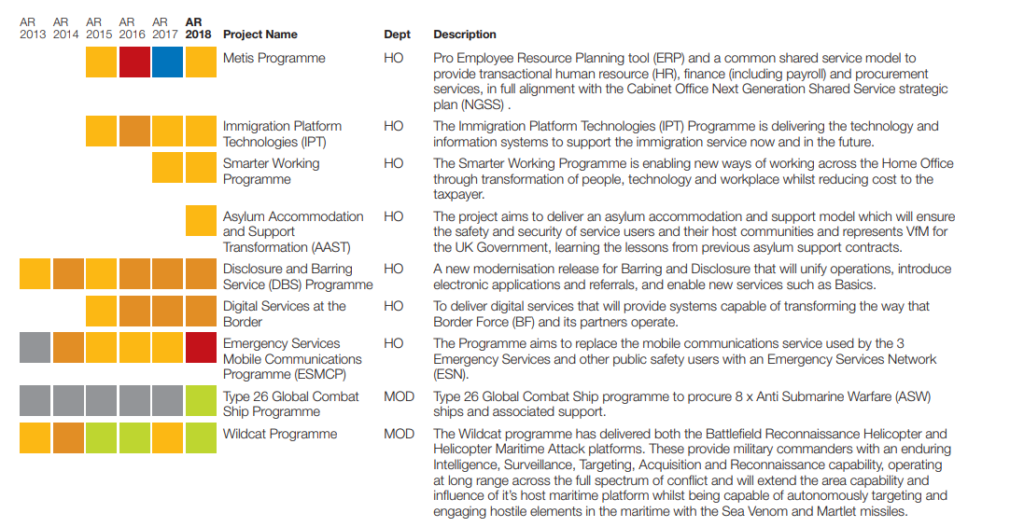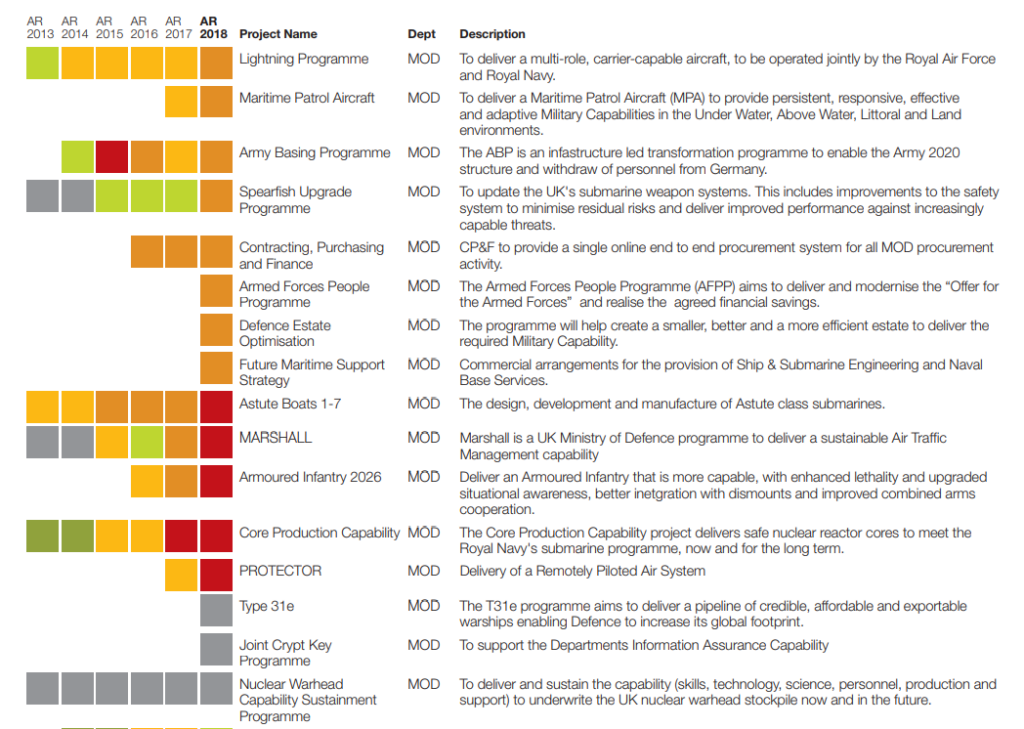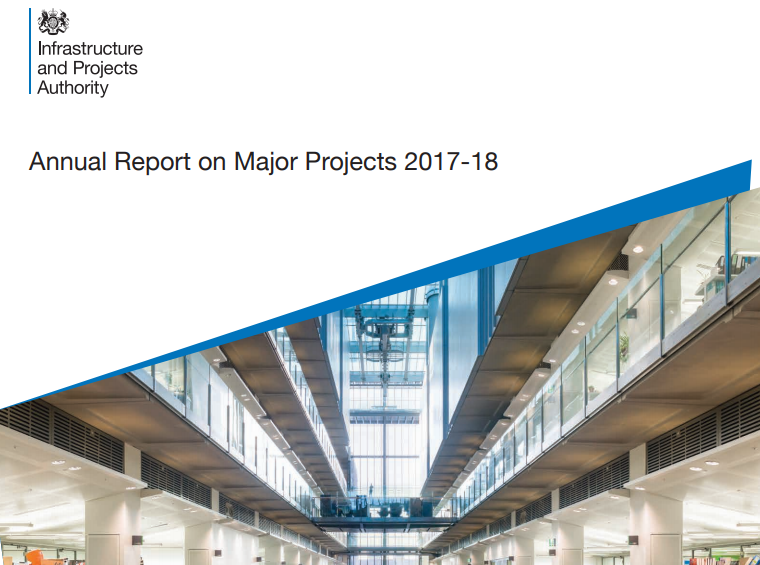The Infrastructure and Projects Authority (IPA) has published its annual report on the Government’s key projects and the Home Office’s Emergency Services Mobile Communications Project (ESCMCP) and a string of defence projects are standout recipients of red warning ratings.
The IPA’s sixth report on the Government Major Projects Portfolio (GMPP) says that 26 of the government’s most important projects have been successfully completed this year.
The projects delivered range from “transformation and ICT programmes which modernise the civil service and make public services more efficient, to infrastructure and construction projects and military capability programmes, which grow our economy, improve productivity and defend the nation.”
The completed projects include the creation of the Francis Crick Institute – the biggest biomedical research facility under a single roof in Europe; the setting up the Thames Tideway Tunnel – a major new sewer to protect the River Thames and create 4,000 new jobs; and the Hosting Services Refresh programme – a major refresh of the Department for Work and Pensions’ IT system, enabling improved digital services for 22 million people.
The IPA’s Annual Report provides a snapshot of how all GMPP projects were progressing, though it is important to make clear the ratings are not as of now, or even of a few months ago. The ratings are actually as of September 2017.
The government said that over half of this year’s 26 completed projects received a Green or Amber Green Delivery Confidence Assessment (DCA) – the IPA’s rating of a project’s chance of success at a specific point in time.
The report points out, however, that projects usually join the GMPP at an early stage and with an uncertain delivery landscape, and this is reflected in their DCAs. This year, seven out of the 18 new joiners had amber/red ratings and none joined at green or amber/green.
As evidenced by the Public Accounts Committee’s interest in the project, the Home Office’s ESMCP project appears to be in significant trouble, having now slipped to a red rating when it was amber a year ago. A red rating, according to the report, means successful delivery of the project appears “unachievable”. It means there are “major issues with project definition, schedule, budget, quality and/or benefits delivery, which at this stage do not appear to be manageable or resolvable. The project may need re-scoping and/or its overall viability reassessed.”
The report’s narrative on ESMCP says, “In the light of continuing challenges with some of the authority projects and subsequent evidence of further slippage from the main suppliers, work has started on a full scale programme re-plan. The aim is to complete the re-plan, engage in commercial renegotiations and recalculate the Full Business Case (FBC) numbers by late September 2018.
“The Programme is working to clarify with confidence when ESN will be Service Ready and Transition can start. The Mobilisation phase of the Programme has been extended by 9 months following completion of CR110. The next phase, Transition, was due to commence in June 2018 but further supplier slippage is likely. We have been working with Business Change Leads and Senior Service Users to understand the impacts of delay to Transition. The Programme re-planning exercise will determine the financial impact on Mobilisation, Transition and Airwave extensions beyond the current planned National Shutdown Date (NSD) of 31 December 2019.”
Five Ministry of Defence (MoD) projects: Astute Boats – the design, development and manufacture of Astute class submarines; MARSHALL – the programme to deliver a sustainable Air Traffic Management capability; the Armoured Infantry 2026 project; the Core Production Capability project to deliver safe nuclear reactor cores to meet the Royal Navy’s submarine programme; and PROTECTOR, the delivery of a remotely piloted air system – all gain notable red flags.
Meanwhile, the government’s GOV.UK Verify identity assurance scheme has slipped to amber, from green. What is interesting about Verify, according to the report, is that the amber rating reflects problems not with its technical delivery, but its take-up.
The report says, “The programme’s status is amber. This reflects the programme’s technical delivery, which was rated GREEN by the IPA review team, but also reflects the challenges in achieving the necessary user volumes to the timescales initially planned.
“A revised strategic approach to digital identity, and business case, have since been developed and work is ongoing to agree this revised approach.
“User volumes have been lower than forecast due to slower than anticipated digital transformation across government. Work is underway to develop cross-government agreement on the approach to digital identity in the intermediate term. The programme continues to iterate the product to ensure that it meets HMG’s needs.”
Discussing the report, Cabinet Office Minister for Implementation, Oliver Dowden MP said, “We are focused on building a Britain that is fit for the future and this report shows just how much we have achieved. All of these projects will improve the way we deliver public services in this country.
“Project delivery is at the heart of all government activity as it is the main way we implement our most important policy priorities. Getting these projects right is essential to build a country that works for everyone.”
IPA chief executive, Tony Meggs said, “The collective size and scope of these projects is impressive. It takes years of hard work from the cadre of world class project delivery professionals in government to deliver projects of this scale and complexity.”
“The current portfolio of government major projects remains a broad and ambitious one. It is vital that we continue to help create the right environment for their successful delivery.”









